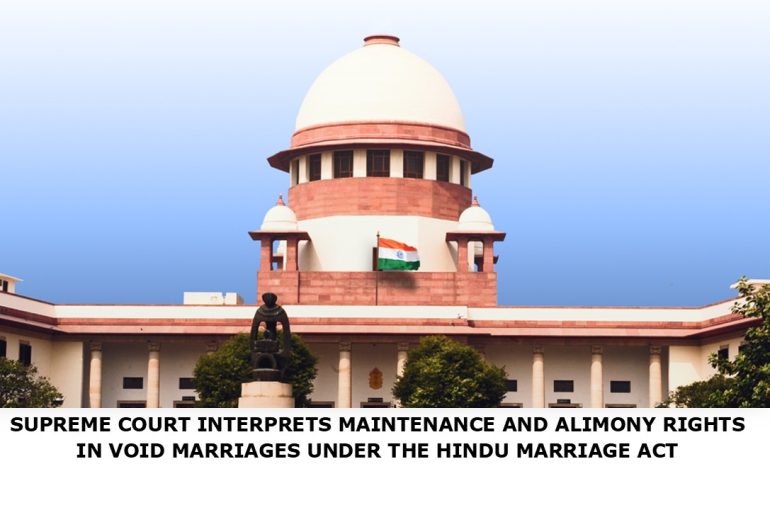SUPREME COURT INTERPRETS MAINTENANCE AND ALIMONY RIGHTS IN VOID MARRIAGES UNDER THE HINDU MARRIAGE ACT
The Judgment in the Case of (Sukhdev Singh v. Sukhbir Kaur (Civil Appeal No. 2536 of 2019) delivered by a Three Judge Bench of the Supreme Court of India, comprising Hon’ble Justice Abhay S Oka, Justice Ahsanuddin Amanullah and Justice Augustine George Masih on February 12, 2025. The case clarifies the entitlement to alimony and maintenance under Sections 24 and 25 of the Hindu Marriage Act, 1955, in void marriages under Section 11. The Supreme Court ruled that maintenance can be granted in such cases to ensure fairness and financial protection.
Facts of the Case
This case involves a reference to a three-judge Bench of the Supreme Court of India to address conflicting views on the applicability of Sections 24 and 25 of the Hindu Marriage Act, 1955. Specifically, the issue concerns whether a spouse in a marriage declared void under Section 11 of the Act is entitled to claim maintenance pendente lite and permanent alimony. The referral stems from the Order dated 22nd August,2024. Several judgments support granting alimony in such cases, including Chand Dhawan v. Jawaharlal Dhawan((1993) 3 SCC 406) and Rameshchandra Rampratapji Daga v. Rameshwari Rameshchandra Daga((2005) 2 SCC 33) On the other hand, judgments such as Yamunabai Anantrao Adhav v. Anantrao Shivram Adhav((1988) 1 SCC 530) oppose granting alimony. The Court was tasked with interpreting Sections 24 and 25 in the context of void marriages under Section 11
Issues
The following questions arose before the Supreme Court for consideration:
(i)Whether a spouse of a marriage declared as void by a competent Court under Section 11 of the 1955 Act(void marriages) is entitled to claim permanent alimony and maintenance under Section 25 of the 1955 Act?
(ii)Whether in a petition filed for seeking a declaration under Section 11 of the 1955 Act, a spouse is entitled to seek maintenance pendente lite under Section 24 of the 1955 Act?
Arguments by the Appellant (Husband):
The Appellant referred to the Full Bench judgment of the Bombay High Court in Bhausaheb @ Sandhu s/o Raghuji Magar v. Leelabai w/o Bhausaheb Magar ((2004) AIR Bom. 283 (FB)) to distinguish between an illegitimate wife and a divorced wife. Relying on this precedent, the Appellant urged the reconsideration of previous judgments that supported maintenance for parties in void marriages.
He argued that marriages declared void are void ab initio, and a void marriage spouse cannot be considered a “spouse” for maintenance under Section 25.
He also Cited hypothetical void marriage situations (e.g., incestuous or bigamous marriages) to assert the absurdity of granting maintenance.
Arguments by the Respondent-Wife:
The (Wife) Relied on the judgment in Chand Dhawan and Rameshchandra Daga (supra) She also Invoked Article 15(3) of the Indian Constitution, highlighting that Section 25 is a protective provision for women.
The Respondent referred to Section 25’s applicability to ensure fairness and support for women, even in void marriages.
Supreme Court
The Apex Court held that, Under Sections 5 and 11 of the Hindu Marriage Act, 1955, void marriages fall into three categories: marriages during the subsistence of a prior marriage, marriages within prohibited degrees of relationship (unless custom allows), and marriages between sapindas (unless custom permits). Such marriages are considered void ab initio, meaning they are non-existent in the eyes of the law. Section 25 of the Act empowers courts to grant permanent alimony and maintenance either at the time of passing any decree or later. The term “decree” under Section 25 encompasses various orders affecting marital status, including restitution of conjugal rights (Section 9), judicial separation (Section 10), declarations of void marriages (Section 11), annulment of voidable marriages (Section 12), and divorce (Sections 13 and 13B). Judicial interpretation in cases like Chand Dhawan and Rameshchandra Rampratapji Daga(supra) has expanded the scope of “decree,” confirming that alimony can be granted even in void marriages once the marriage is declared void by the court. Courts must also ensure no undue delay in seeking decrees and strive for reconciliation under Section 23. Section 24 of the Hindu Marriage Act allows courts to grant interim maintenance during proceedings under Sections 9 to 13, provided the spouse applying lacks independent income for support and litigation expenses. The grant is discretionary and subject to the applicant’s conduct. Importantly, maintenance under Section 24 may be granted even in void or voidable marriages if conditions are satisfied. Section 25 also allows spouses from void marriages under Section 11 to seek permanent alimony or maintenance, with courts exercising discretion based on case facts and conduct. Therefore, the courts’ wide interpretation of “decree” ensures financial protection even in cases of void marriages, reinforcing judicial consistency across cases.
PARICHAYA REDDY
ASSOCIATE
THE INDIAN LAWYER & ALLIED SERVICES
Please log on to our YouTube channel, The Indian Lawyer Legal Tips, to learn about various aspects of the law. Our latest video, titled ‘Legal Framework for Artificial Intelligence’ can be viewed at the link below:





































Leave a Reply